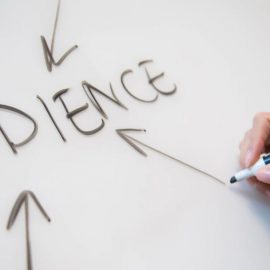

This article is an excerpt from the Shortform book guide to "TED Talks" by Chris Anderson. Shortform has the world's best summaries and analyses of books you should be reading.
Like this article? Sign up for a free trial here .
Is it a good idea to write a speech script? What are the potential downsides of speaking from a script?
According to Chris Anderson, the author of TED Talks, scripting has both benefits and downsides, and depending on your confidence level, it may or may not be a good idea. If public speaking evokes great anxiety, scripting can help. But speaking from a script can make your speech bland and dispassionate. If you decide to write a speech script, consider if you are going to read off the script or memorize it.
Let’s consider the risks and benefits of both.
Scripted and Memorized
Benefits: You can ensure that there’s time for everything you want to say; you can choose your words carefully; and you can practice your speech on other people, which allows for feedback and improvement. (Shortform note: For people who suffer from intense fear of public speaking (glossophobia), scripting and memorizing the speech script is the favored option because it gives a feeling of control and preparation.)
Risks: Memorized speeches can come across as dry and unengaging. Even though your audience knows that your thoughts are scripted in one way or another, they like to feel as if they’re part of the moment as it unfolds naturally. Anderson explains that this is similar to how people prefer to watch sports live rather than recorded—they want to believe that they’re part of the action. (Shortform note: While inspiring your audience is the ideal result, those with the most severe forms of glossophobia might be trying to just make it through the speech without panicking or feeling humiliated. If this is you, getting through the speech is more important than avoiding the risks Anderson mentions here.)
Rehearsal: If you decide to memorize your speech, Anderson says you have to really commit. In the beginning of rehearsal, the speech will come out passionately but not super smooth. Once you reach the memorization point, the speech will come out smoothly—so smoothly in fact, that it will lack character. It will be flat and without passion. This is where most people stop practicing, which Anderson says is a mistake. If you push past this stage of memorization and continue to practice, you’ll eventually get to a point where you know the speech so well that you’re no longer concentrating on the words and the passion will return to your voice.
Bottom line: Don’t stop practicing your speech once you’ve memorized it—keep going until you have fully embodied it. Anderson says you’ll know you’re ready when you can recite your entire speech while doing another cognitively demanding task (solving math problems, for example).
(Shortform note: Proponents of this method include Jill Bolte Taylor, Brené Brown, and Amanda Palmer. Bolte Taylor says she rehearsed her TED talk over 200 times, and Palmer says she practiced over a period of four months.)
Scripted and Read
Benefits: Anderson says there are two occasions when reading your speech works well: First, if the speech is paired with gorgeous imagery and your audience’s eyes are on your images instead of you. Second, if you’re a gifted writer and the audience understands that they’re hearing a piece of written work. (Shortform note: With the right tools (such as a teleprompter) and lots of practice, you can master reading without drawing attention to yourself. We discuss these tools in Part 5.)
Risks: There are three major risks if you choose to read your speech: First, your audience might not trust your authenticity. Second, they might perceive you to be unprepared. Third, your audience might become so bored that they tune you out or leave. (Shortform note: Despite these risks, reading a speech might be the better option if you don’t have time to memorize it, especially in situations where your authenticity isn’t going to be doubted—for example, eulogies at funerals are usually read, not memorized.)
Rehearsal: If you’re a writer reading a written work (such as a poem), Anderson recommends you still know your speech well enough that you can look up at your audience from time to time and so your voice will sound natural. He adds that with read speeches, it can be especially impactful if you stand up at the end and deliver your last paragraph without reading. (Shortform note: Amanda Gorman balanced reading and looking up at the audience—to great effect—while reading her poem, “The Hill We Climb,” at President Biden’s inauguration ceremony.)

———End of Preview———
Like what you just read? Read the rest of the world's best book summary and analysis of Chris Anderson's "TED Talks" at Shortform .
Here's what you'll find in our full TED Talks summary :
- A nuts-and-bolts guide to public speaking that takes you from the initial idea to your final bow
- TED curator Chris Anderson's public speaking advice on everything from scripting to wardrobe
- A comparison of Anderson's advice to that of other public speaking experts






